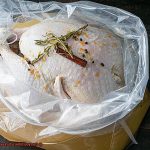Thanksgiving has come and gone, but the turkey in your fridge is still going strong. Now you’re left wondering if it’s safe to eat that leftover bird after a week. It’s a common question, and one that deserves an answer. You don’t want to risk getting sick from spoiled food, but you also don’t want to waste any of that delicious turkey.
The answer isn’t as simple as a yes or no. There are many factors at play when it comes to determining the shelf life of cooked turkey in the fridge. Some say it can last up to a week with proper storage, while others suggest eating it within 3-4 days. So what’s the truth?
In this post, we’ll delve into the science behind food storage and explore the factors that affect how long your turkey will last in the fridge. We’ll share tips on how to store your turkey correctly to keep it fresh for as long as possible, and we’ll also discuss warning signs that indicate when your turkey has gone bad.
By the end of this article, you’ll have a clear understanding of how long you can safely keep your leftover turkey in the fridge and know what signs to look for before taking a bite. So let’s get started and make sure none of that precious holiday food goes to waste.
Contents
What is the Difference Between Raw and Cooked Turkey?
Turkey is a versatile and tasty protein that can be enjoyed in countless dishes. However, the difference between raw and cooked turkey is essential when it comes to food safety and shelf life. Raw turkey has a higher risk of bacterial growth compared to cooked turkey, which affects its shelf life.
Raw turkey should be consumed within one to two days of purchase or defrosting, while cooked turkey can last up to four days in the fridge if stored properly. The reason for this is that raw turkey is often contaminated with harmful bacteria such as salmonella and campylobacter. These bacteria thrive at temperatures between 40°F and 140°F, also known as the danger zone. Therefore, it’s crucial to store raw turkey at a temperature below 40°F to prevent bacterial growth.
Cooked turkey, on the other hand, undergoes high temperatures during cooking that kill most of the bacteria. However, cooked turkey should also be stored properly to prevent bacterial growth. Within two hours of cooking, store it in an airtight container and place it in the fridge.
If you plan on storing raw turkey for longer than two days, freezing is a better option. Freezing can extend the shelf life of raw turkey up to six months.
When storing either raw or cooked turkey in the fridge, follow food safety guidelines strictly. The meat should be stored in an airtight container or wrapped tightly with plastic wrap or aluminum foil. Place it on the bottom shelf of the fridge to avoid any drips contaminating other foods. Also, remove any leftover bones from the meat before storing them as they can promote bacteria growth.
Lastly, always use your best judgment when deciding whether or not to consume any leftover turkey, even if it has been stored properly. The temperature fluctuations and how well the turkey was initially cooked can affect its safety. Always check for any signs of spoilage such as an off odor or slimy texture before consuming any leftover turkey.
How Long Does Cooked Turkey Last in the Fridge?
If so, it’s important to know how long you can safely store cooked turkey in the fridge. The answer is up to four days, but some sources suggest it may be safe for up to a week. However, it’s crucial to store it properly to prevent the growth of harmful bacteria.
To keep your turkey fresh, store it in an airtight container or wrap it tightly in plastic wrap or aluminum foil. Be sure to refrigerate it promptly after cooking and keep it at a temperature below 40°F. If you notice any changes in texture or flavor, such as dryness or an off smell, it’s best to discard it rather than risk consuming spoiled meat.

Remember that even if the turkey is safe to eat, its quality may deteriorate over time. So, if you’re unsure about its safety or have any doubts, it’s always better to err on the side of caution and throw it out. Consuming spoiled meat can lead to foodborne illnesses such as salmonella or E. coli infections.
How to Store Raw Turkey in the Fridge
Storing raw turkey in the fridge is a crucial step to ensure its freshness and safety for consumption. Here are some tips to help you store your raw turkey in the fridge:
Keep it cool
The first thing to keep in mind is the temperature of your fridge. It should be set at 40°F or below to prevent the growth of harmful bacteria. Always check the temperature of your fridge regularly, especially during hot weather.
Wrap it up tightly
Before storing raw turkey in the fridge, ensure that it is properly wrapped or packaged in a leak-proof container. This will prevent any juices from leaking onto other food items and contaminating them.
Store on a bottom shelf
To avoid cross-contamination, store raw turkey on the bottom shelf of the fridge. If you can, place a tray or pan underneath it to catch any drippings.
Place it in the back
When storing raw turkey for more than a day, put it in the coldest part of your refrigerator, usually at the back of the bottom shelf. This will maintain a consistent temperature and keep it fresh for longer.
Check for signs of spoilage
Before cooking leftover turkey that has been stored in the fridge for several days, check for any signs of spoilage like discoloration, unusual odors, or slimy texture. If you notice any of these signs, discard the turkey immediately as it may be unsafe to eat.
How to Store Cooked Turkey in the Fridge
Your Thanksgiving feast was a success, and you have a delicious turkey waiting to be enjoyed for days to come. But how do you store your cooked turkey in the fridge to ensure it remains safe and fresh? Here are some tips to help you keep your turkey tasty and healthy.
Properly Cool Down the Turkey
After cooking your turkey, it’s essential to let it cool down to room temperature before placing it in the fridge. Bacteria can grow quickly in warm temperatures, leading to spoilage and potential foodborne illness. Make sure to cool your turkey down within two hours of cooking it, either by leaving it at room temperature or placing it in the fridge.
Store in an Airtight Container
Once your turkey has cooled down, place it in an airtight container or wrap it tightly with plastic wrap or aluminum foil. This will prevent air from getting in and drying out the meat, as well as preventing any odors from other foods in the fridge from permeating the turkey.
Use the Bottom Shelf of the Fridge
To avoid any drips contaminating other foods, store your turkey on the bottom shelf of the fridge. Avoid storing it on the door as it is a warmer part of the fridge and more prone to temperature fluctuations that can cause spoilage.
Consume Within Four Days
While cooked turkey can last up to four days in the fridge if stored properly, it’s best to consume it within this timeframe. If you have leftover turkey that you know you won’t be able to consume within four days, freeze it instead.
Reheat Properly
When reheating your leftover turkey, make sure to heat it to an internal temperature of 165°F (74°C) before consuming. This can be done in the oven, on the stovetop, or in the microwave. Avoid reheating the same portion multiple times as this can increase the risk of bacterial growth.
What Factors Affect The Longevity of Stored Turkey?
To ensure your turkey stays fresh and safe to eat, let’s explore the key sub-topics and factors you should keep in mind.
First and foremost, maintaining the right temperature is critical. Your fridge should be kept at 40°F or below to prevent bacteria from growing on your turkey and causing spoilage. Use a reliable thermometer to keep track of the temperature and avoid any fluctuations.
The freshness of your turkey is another important factor. If you purchase a bird that’s been sitting around for too long, it may not last as long in your fridge as a fresher turkey. Additionally, how the turkey was handled and stored before you purchased it can also impact its shelf life.
When it comes to storing your turkey in the fridge, there are some best practices to follow. It’s recommended to keep the turkey in its original packaging or store it in an airtight container to prevent air from getting in and causing spoilage. Raw turkey should always be kept separate from other foods in the fridge to avoid cross-contamination.
Finally, how long you plan to store the turkey plays a huge role in determining its longevity. While leftovers can be stored safely in the fridge for up to a week, it’s ideal to consume them within 3-4 days for optimal safety and quality.
Signs of Spoilage To Look Out For
If you’re planning to store your bird in the fridge, it’s crucial to know the signs of spoilage to avoid a disastrous holiday meal. Don’t let a bad turkey ruin your festivities; keep an eye out for these telltale signs.
First and foremost, trust your nose. A foul or funky odor emanating from the turkey is a clear sign that it has gone bad. If your turkey smells off, it’s time to toss it out. Another visual cue of spoilage is a change in color. Dark spots or discoloration on the meat are warning signs that something’s not right.
But it’s not just about appearance and odor. The texture of your turkey can also reveal whether it’s still safe to eat. If the turkey feels slimy or sticky to the touch, bacteria have likely started to grow on its surface, which means it needs to go straight into the bin. Additionally, if the texture is mushy or spongy, it’s another indication that the meat is breaking down and should not be consumed.
It’s worth noting that even if you’ve taken all the necessary precautions and stored your turkey properly, these signs of spoilage can still occur. To minimize the risk of spoilage, aim to consume your turkey within 3-4 days after purchasing or preparing it, depending on how it was stored and cooked.
In summary, here are some signs of spoilage to look out for when storing turkey in the fridge:
- Foul or unpleasant odor
- Discoloration or dark spots on the meat
- Slimy or sticky texture
- Mushy or spongy consistency
Tips for Storing Leftover Turkey Safely
Leftover turkey is a staple for many households after Thanksgiving, but it’s important to store it safely to avoid any risk of foodborne illness. Here are some tips for storing leftover turkey safely:
Refrigerate promptly
After your meal, slice the meat from the bone and store it in shallow containers to promote rapid, even cooling. Don’t leave the turkey at room temperature for more than two hours. Place the containers in the refrigerator within two hours of cooking to prevent bacteria growth.
Use airtight containers
To prevent moisture from getting in and bacteria from growing, make sure to use airtight containers or wrap your leftover turkey tightly in plastic wrap or aluminum foil.
Avoid overcrowding
Don’t stuff your fridge when storing leftover turkey. Overcrowding can prevent cold air from circulating properly, which can cause food to spoil more quickly.
Label and date
By labeling and dating your containers of leftover turkey, you can keep track of how long they’ve been in the fridge and avoid any risk of spoilage.
Reheat properly
When reheating leftover turkey, make sure it’s heated to an internal temperature of 165°F (74°C) before serving. Use a meat thermometer to check the temperature and make sure there are no cold spots.
Following these tips can help you safely store your leftover turkey for up to four days in the fridge. If you don’t think you’ll be able to eat it within that time frame, consider freezing it instead. Leftover turkey can be frozen for up to six months if stored properly in air-tight containers or freezer bags.
OxZ6ZjKcm0A” >
Conclusion
In conclusion, the longevity of your turkey in the fridge isn’t a cut-and-dry answer. It’s dependent on several factors, including how it was stored, its freshness upon purchase, and whether it’s cooked or raw. Raw turkey should be consumed within two days of being defrosted or purchased, while cooked turkey can last up to four days if stored properly.
To ensure your leftover turkey stays fresh and safe to eat, wrap it tightly in an airtight container or plastic wrap and store it on the bottom shelf of your fridge. It’s essential to keep the temperature below 40°F and check for any signs of spoilage before consuming any leftovers.
By following these guidelines on storing your turkey correctly, you can savor it for up to four days after Thanksgiving. However, if you’re unsure about its quality or safety, don’t take any chances – discard it instead.






